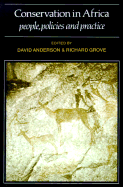Book contents
- Frontmatter
- Contents
- Preface
- List of contributors
- Introduction: The scramble for Eden: past, present and future in African conservation
- Part One Conservation ideologies in Africa
- Part Two Wildlife, Parks and Pastoralist
- Introduction
- 5 Pastoralism, conservation and the overgrazing controversy
- 6 Pastoralists and wildlife: image and reality in Kenya Maasailand
- 7 Integrating parks and pastoralists: some lessons from Amboseli
- 8 The Mursi and National Park development in the Lower Omo Valley
- Part Three Conservation priorities and rural communities
- Part Four Consequences for conservation and development
- Index
Introduction
Published online by Cambridge University Press: 04 April 2011
- Frontmatter
- Contents
- Preface
- List of contributors
- Introduction: The scramble for Eden: past, present and future in African conservation
- Part One Conservation ideologies in Africa
- Part Two Wildlife, Parks and Pastoralist
- Introduction
- 5 Pastoralism, conservation and the overgrazing controversy
- 6 Pastoralists and wildlife: image and reality in Kenya Maasailand
- 7 Integrating parks and pastoralists: some lessons from Amboseli
- 8 The Mursi and National Park development in the Lower Omo Valley
- Part Three Conservation priorities and rural communities
- Part Four Consequences for conservation and development
- Index
Summary
Pastoralists, using the broad definition of the term adopted by Sandford (1983), are very often regarded as a threat to the interests of wildlife conservation, either on grounds of their hunting as a subsidiary economic activity, or of the pressure their mode of livelihood imposes on the grasslands shared by wild herbivores, whose grazing needs and seasonal movements are so often identical with those of domestic stock. It is frequently their misfortune to occupy territories which are not only unstable and peculiarly susceptible to even minor climatic fluctuations, but are also the habitat of wildlife species that have already been exterminated in or driven from land used for cultivation by settled communities. Pastoral societies, ranging from the true nomad to transhumant communities whose populations make use of different and seasonally variable land types, have frequently come to be regarded as obstacles to the national development process and contemporary perceptions of the aims of 'modernisation'. In the post-colonial era ‘exponents of sedentary civilisation have come to regard the word nomad as a term of abuse’ (Abdel Ghafar, 1976). The reasons for this are many. Migratory life is perceived as incompatible with the introduction of essential social services, especially education and health. Pastoral systems are also often seen as wasteful of available land resources, regardless of the fact that such resources are usually marginal and incapable of viable exploitation by other means. Highly mobile societies present problems of administrative control, public security and the administration of justice, while they have often been regarded as outmoded reservoirs of separatist tribal consciousness, an obstacle to national awakening and incompatible with the aspirations of the modern state.
- Type
- Chapter
- Information
- Conservation in AfricaPeoples, Policies and Practice, pp. 105 - 110Publisher: Cambridge University PressPrint publication year: 1988
- 1
- Cited by



